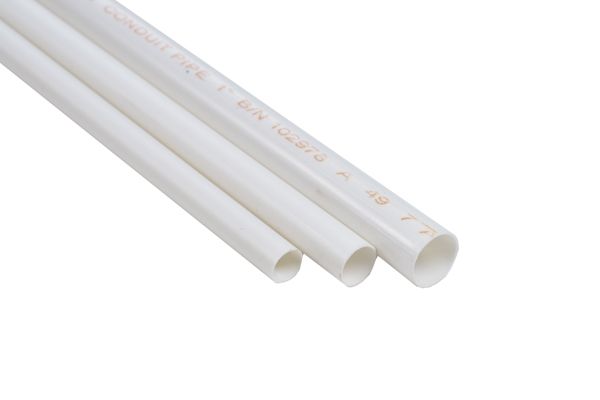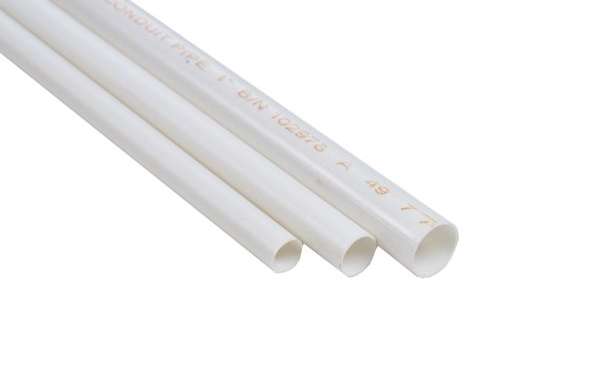Conduit pipes play an essential role in protecting electrical wiring in various settings. They are designed to shield wires from environmental factors, physical damage, and interference, ensuring a safe and efficient electrical system. This article explores the different types of conduit pipes, their applications, and the benefits they offer in various contexts.

Types of Conduit Pipes
- Rigid Metal Conduit (RMC)
- Material: Typically made of galvanized steel or aluminium.
- Applications: Commonly used in industrial and commercial settings due to its robustness and ability to withstand harsh environments.
- Benefits: Provides excellent protection against physical damage and is highly durable. It also offers a high degree of security against tampering.
- Intermediate Metal Conduit (IMC)
- Material: Made of a thinner, lighter steel than RMC.
- Applications: Suitable for both indoor and outdoor use, including areas where RMC might be too heavy or cumbersome.
- Benefits: Lighter and easier to work with than RMC, while still offering substantial protection. It is also corrosion-resistant and can be used in a variety of environments.
- Electrical Metallic Tubing (EMT)
- Material: Made of galvanized steel but is thinner and lighter than RMC and IMC.
- Applications: Typically used in commercial and industrial buildings for exposed wiring due to its ease of installation.
- Benefits: Offers a good balance between protection and flexibility. Its lightweight nature makes it easy to install, and it can be bent to navigate around obstacles.
- Flexible Metal Conduit (FMC)
- Material: Constructed of helically wound, interlocking metal strips.
- Applications: Ideal for areas where flexibility is required, such as in walls or around machinery that moves or vibrates.
- Benefits: Provides excellent flexibility, making it easier to route wiring around corners and through tight spaces. It also offers good protection against mechanical damage.
- Liquid-Tight Flexible Metal Conduit (LFMC)
- Material: Similar to FMC but includes a plastic coating to make it waterproof.
- Applications: Used in wet or damp locations, such as outdoor installations or areas exposed to moisture.
- Benefits: Combines the flexibility of FMC with the added benefit of being water-resistant, making it ideal for harsh environments.
- Polyvinyl Chloride (PVC) Conduit
- Material: Made of a type of plastic called polyvinyl chloride.
- Applications: Widely used in residential and commercial applications, particularly in underground or wet locations.
- Benefits: Lightweight, easy to install, and resistant to corrosion and moisture. It is also non-conductive, which provides an extra layer of safety.
Applications of Conduit Pipes
- Residential Buildings
- Conduit pipes are used to protect wiring within homes. PVC conduits are particularly popular due to their ease of installation and cost-effectiveness.
- Commercial Buildings
- In commercial settings, EMT and IMC conduits are commonly used. They offer a balance of protection and ease of installation, suitable for the complex wiring systems often found in commercial buildings.
- Industrial Environments
- RMC and LFMC conduits are frequently used in industrial settings where wiring is exposed to harsh conditions. Their durability and resistance to physical damage and moisture make them ideal for such applications.
- Outdoor Installations
- For outdoor applications, such as garden lighting or external power supplies, PVC and LFMC conduits are preferred. They protect wiring from environmental elements, ensuring longevity and reliability.
- Specialized Environments
- In areas requiring high flexibility, such as around machinery or in walls, FMC conduits are used. They can bend and flex without breaking, making them suitable for dynamic environments.
Benefits of Using Conduit Pipes
- Protection
- Conduit pipes provide robust protection for electrical wiring against physical damage, moisture, and corrosion. This ensures the longevity and safety of the electrical system.
- Safety
- By encasing wires in non-conductive materials, such as PVC, conduits reduce the risk of electrical shocks and fires. Metal conduits also provide grounding, further enhancing safety.
- Organization
- Conduits help organize and route electrical wiring systematically, reducing clutter and making maintenance easier. This is particularly important in complex installations with multiple circuits.
- Compliance
- Using conduits helps meet electrical codes and standards, ensuring that installations are safe and legal. This is crucial for both residential and commercial buildings.
- Flexibility
- Certain types of conduits, like FMC and LFMC, offer flexibility, making them ideal for applications where wiring needs to navigate tight spaces or move with machinery.
- Aesthetics
- Conduits can improve the appearance of an installation by hiding unsightly wires. This is particularly important in visible areas of commercial and residential buildings.
Conduit pipes are a vital component of modern electrical systems, offering protection, safety, and organization for wiring. The choice of conduit depends on the specific application and environmental conditions. By understanding the types and benefits of conduit pipes, electricians and builders can ensure reliable and safe electrical installations in various settings.








